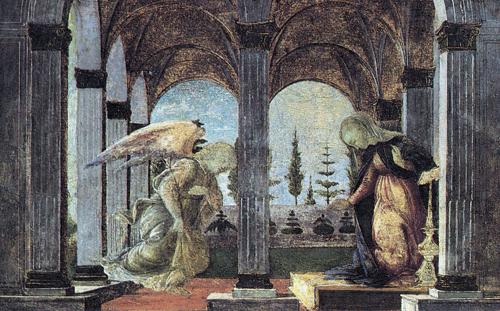Kuvaus
Sandro Botticelli's "Annunciation," painted around 1500, stands as a stunning testament to the achievements of the Florentine Renaissance. Known for his unmistakable style and ability to infuse an aura of spirituality into his works, Botticelli succeeds in capturing the moment when the Archangel Gabriel meets the Virgin Mary, a recurring theme in the history of religious art that symbolizes the Incarnation of Christ.
Looking at the composition of the work, one can see a harmonious and balanced arrangement. The figure of Mary is placed on the left, depicted with a serene elegance that denotes both humility and grace. She wears a dark cloak, which contrasts with the cool blue background of the sky, suggesting the solemnity of the moment. The slight inclination of her body and her expression of wonder seem to capture the essence of her response to the revelation. Gabriel, on the right, stands before her with open gestures and a face that expresses both majesty and benevolence; his clothing, adorned with vibrant colors that include white and gold, highlights the divinity of his presence.
Botticelli's color palette cools and calms the scene. The blue and earthy tones, untouched by the vibrant luminosity of the color, contribute to an atmosphere that is both earthy and ethereal. The light seems to flow through the work, illuminating the figures and producing soft shadows that bring a sense of three-dimensionality to the composition. Botticelli's signature linear style of his work is evident in the crisp, delicate contours that define the characters, while the details of the vegetation and surroundings are minimal but effective; a light background is seen that suggests a serene and almost surreal landscape.
It is interesting to note that while Botticelli captures a moment of great religious significance, he avoids the dramatization typical of other interpretations of the Annunciation. Instead, the work exudes a tranquility that invites the viewer to contemplate the scene with reverence. This is a distinctive feature of his style, which moves away from the intense emotional focus of some of his contemporaries, such as Michelangelo or the artists of the High Renaissance.
Botticelli's Annunciation also reflects the influence of the Neoplatonic culture of his time, which sought to find beauty in the natural world and idealized forms. The elegance of the figures and attention to detail align with classical ideals of perfection and beauty, often idealized in Renaissance works.
Although this piece may not be among Botticelli's most universally known, it is a reflection of his technical mastery and his ability to fuse art with a deep spirituality. The work is situated in a broader context of his artistic production, where religious themes are treated with a unique approach that invites dialogue between the divine and the human.
The 1500 "Annunciation" is therefore a work that not only exemplifies Botticelli's style, but also highlights the evolution of themes and ideas in Renaissance art. Taken together, the composition, the color palette, and the serene depiction of the figures not only tell an ancient story, but also reflect a singular moment in art history that continues to inspire admiration and reflection.
KUADROS ©, a famous painting on your wall.
Hand-made oil painting reproductions, with the quality of professional artists and the distinctive seal of KUADROS ©.
Painting reproduction service with satisfaction guarantee. If you are not completely satisfied with the replica of your painting, we will refund 100% of your money.

